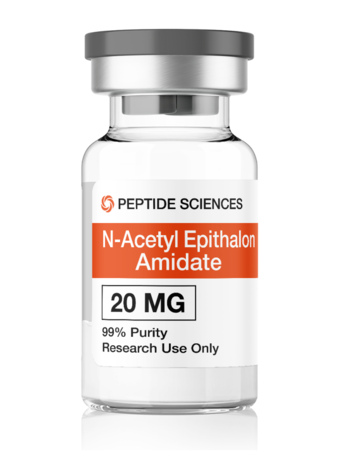Epitalon (Epitalon) — a synthetic derivative of epithalamine and a potential modulator of telomerase, an enzyme that supports and protects the telomere caps at the ends of chromosomes (DNA strands). Studies show that Epithalon causes telomere lengthening and as a result can fight the effects of aging.
N-acetylepithalone amidate
N-Acetyl Epithalon Amidate is a modified version of the synthetic peptide Epithalon (aka Epithalon). Epitalon itself is a component of the natural extract of the pineal gland of cows, which is currently produced synthetically. It is well known for research purposes for its antiaging properties and significant impact on cancer, infectious diseases, DNA regulation (primarily telomeres) and skin health.
Despite the fact that Epitalon was discovered approximately forty years ago at the St. Petersburg Institute of Bioregulation and Gerontology, the peptide is still under active research and provides new knowledge.
More recently, scientists have proposed potential epigenetic mechanisms that explain the effect of Epitalon on the neuronal differentiation of stem cells.
Epitalon modifications do not change the overall function of the peptide, but they do change the half-life, stability, and efficacy of Epitalon. Only two modifications are made to the native
Peptide: -acetylation and amidation.
Each of them has certain advantages that make Epitalon more effective and allow reducing the dosage of the peptide. Acetylation — this is a normal natural process that occurs with many proteins in the body. This is also a process used by the pharmaceutical industry to help the compound reach the central nervous system. Acetylated molecules are much more capable of overcoming the blood-brain barrier (HEB). Acetylation has been shown to increase the rate at which a compound crosses the BBB, thereby increasing the intensity of the compound's effect and helping to reduce the dosage of the compound needed to achieve a specific result.
Aspirin, for example, is an acetylated form of salicylic acid. Studies show that acetylation of salicylic acid strengthens the anti-inflammatory effect of the molecule.
Amidation — another natural protein modification that the pharmaceutical industry uses to improve the half-life of compounds. Amidated proteins are less sensitive to proteolytic cleavage in the bloodstream. They also tend to bind more firmly to their receptors, which makes amidation an excellent means of increasing the activity and efficiency of the compound.
By modifying Epithalon by acetylation and amidation, it is possible to increase the penetration of the peptide into the central nervous system and protect it from degradation during this process. The result is an increase in the effectiveness of a given dose of Epitalon, as well as an increase in the effectiveness of the compound due to improved binding to receptors.
N-acetylepithalonamidate and cancer
Studies on rat models of various tumors have shown that daily administration of Epitalon reduces tumor growth. Currently, the peptide is being studied as a potential adjuvant for the treatment of Her-2/neu-positive (hormone-positive) breast cancer, as well as leukemia and testicular cancer.
It is interesting that one of the main effects of Epitalon in cancer is the regulation of the PER1 gene. PER1, which is found in the hypothalamus, regulates the circadian rhythm and was found to be underexpressed in cancer patients.
N-acetylepithalonamidate and sleep
As noted above, Epithalon regulates the production of PER1 protein, which plays an important role in the circadian rhythm. This is not surprising, given that Epithalon was first isolated from the pineal gland of cows, and the main role of the pineal gland is to regulate the sleep-wake cycle and the reaction of many animals to light. Studies on rats show that Epitalon also regulates the production and release of melatonin, which is a powerful sleep regulator.
By affecting the genes of arylalkylamine-N-acetyltransferase and pCREM, Epitalon
increases the production of melatonin and can restore normal cycles of sleep and wakefulness. Melatonin and the sleep regime are often disturbed due to age, and this phenomenon is most likely the result of changes in the nature of DNA expression. By restoring DNA expression to a younger state, Epitalon helps to compensate for age-related changes in sleep. This, in turn, has a huge impact on everything from cognitive functions to wound healing, immune response, growth hormone secretion, weight gain, bone structure, and cardiovascular health.
N-acetylepithalonamidate: Summary
Although Epithalon is not the only answer to stopping the aging process, it provides insight into how to counteract some of the fundamental processes that lead to DNA and protein damage and can help prevent the overall aging process. According to Dr. Vladimir Havison, the godfather of Epitalon development, as Epitalon research continues, science will gain a deeper and more detailed understanding of what causes mammals in general and humans to age and eventually die. Epithalon is an important key to understanding how biochemical processes can be changed to slow down or even stop some of the fundamental causes of aging. The development of N-acetylepithalonamidate is an important part of epithalon research, since its ability to penetrate into the CNS will facilitate researchers to study the effect of epithalon on brain aging. This is likely to allow us to understand how biochemical processes, such as sleep and neuron growth, affect learning, memory, cognitive stability, and much more.




There are currently no reviews for this product.
Your review will be the first.
Tell other users of the site about the advantages and features of the product, share your impressions and expert opinion.